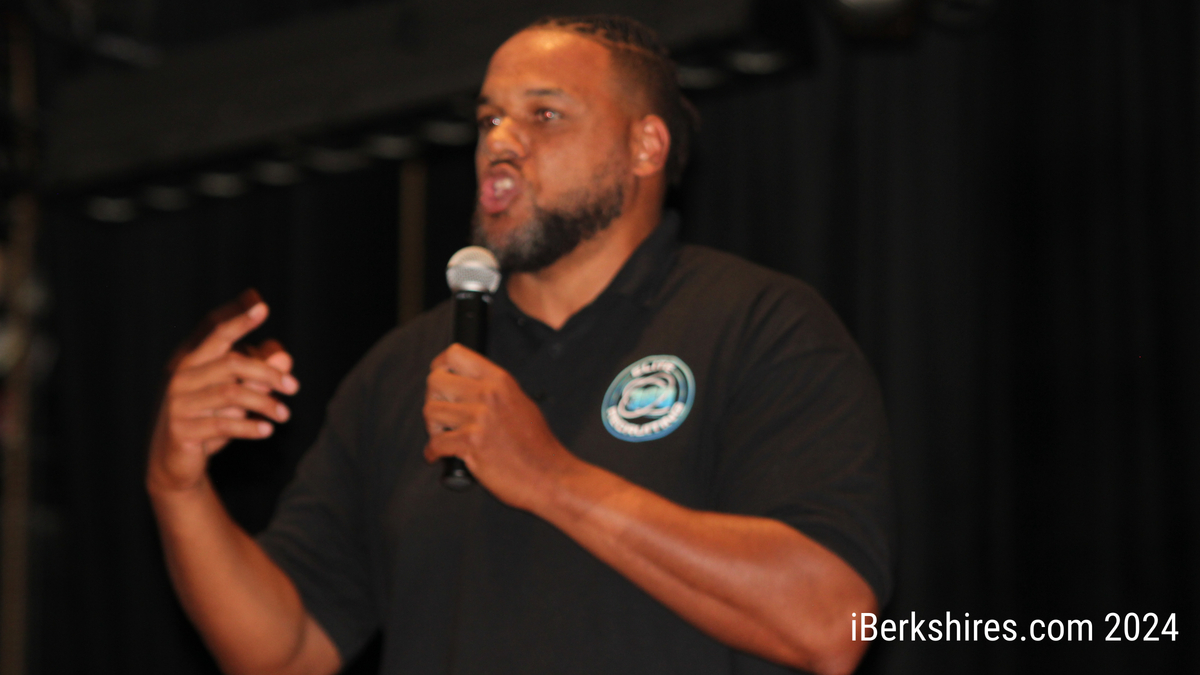Former NFL Player Shares Message on Overcoming AdversityBy Stephen Dravis, iBerkshires.com Sports
06:20AM / Thursday, August 29, 2024 | |
 Keith Willis Wednesday makes a point to Wahconah Regional High School student-athletes during a talk at Nessacus Middle School. Keith Willis Wednesday makes a point to Wahconah Regional High School student-athletes during a talk at Nessacus Middle School. |
DALTON, Mass. – By any reasonable measure, Keith Willis has been a success in sports and in life.
And the former NFL tight end probably inspired a little awe among the Wahconah High School student-athletes who filled the Nessacus Middle School auditorium on Wednesday evening.
But he did not come to show off. He came to show those students how to be winners themselves.
“How many think it’s cool that I played for five different NFL teams?” Willis said, asking for a show of hands from the youngsters. “It’s pretty cool, right?
“You know what people don’t think about? That means I was cut five different times.”
Willis was an all-America high school football player and multi-sport star in Virginia who went on to stand out at Virginia Tech before playing in the NFL from 2004 to 2008.
Today, he is an entrepreneur and motivational speaker. And this week he is making several more stops in the Berkshires to inspire youngsters.
On Friday, he will address students at Pittsfield and Taconic High Schools before giving a talk at the Boys and Girls Club of the Berkshires at 4:30.
Wednesday evening, his message focused on the value of facing adversity – sharing personal stories about his life in professional football and the pain of losing a chance to play basketball, his favorite sport, at the collegiate level.
“People see the success,” Willis said. “They say, ‘Oh, he went to college.’ And, ‘He played multiple sports.’ All that’s cool. … What people don’t realize is to make it to that level, you have to get accustomed to and comfortable in adversity.
“I’m going to show you today how athletics prepared me for life. It takes a special human being to commit to being a student-athlete. … Being a student athlete is not for the weak. But the beautiful thing I appreciate about being a student-athlete is what it builds inside of you.”
And if an athlete does not build resilience in the face of failure, they will not go very far, Willis said.
“When the Friday night lights come on, when you’re on the soccer field, the basketball court, the lacrosse field or the track, when the tension is high and the intensity is high – that’s when it really matters,” Willis said. “I’ve been fortunate to be in a lot of high pressure situations, and I’ve seen people from middle school, high school, college and the pros. And no matter what level, I’ve seen people crumble when the lights turn on. I’ve seen people fold.
“Whatever is inside of you will come out of you through adversity. … When you hit adversity, you naturally revert back to your training. When you hit adversity, who you are comes out. I love seeing people when their back’s against the wall, because I find out, ‘What’s your DNA? What’s your genetic makeup? What’s inside of you?’ That’s what I need to know, not what you say. I don’t care how many weights you can lift, how many laps you run, how fast you can run. That’s cool to give you advantages. But I’ve seen people that might not be as physically strong but have the internal makeup of somebody who can bench 500 pounds and run all day long because of who they are inside.”
Willis talked about his own journey as an athlete, pushing himself in high school by taking up track and field, which he described as his fourth favorite sport after basketball, football and baseball.
“The sport that tested me the most was track and field,” he said. “I only ran track to become better in basketball and football. I wanted to become more athletic, more explosive. I wanted to become more flexible and how to run faster. But my mother told me something … she said, ‘I don’t care if you come in first, but you better not get last.’ In my weakest sport, ‘I don’t care if you get first, but you better not get last.’ What does that tell me? I’m not losing this race. Somebody is going to finish behind me.
“I had to work extra hard, because it didn’t come naturally to me. I had to learn how to run the hurdles, I had to learn how to do the long jump, I had to learn how to run the 400, learn how to do the high jump. Everything. Just so I wouldn’t embarrass myself on the track.
“But what happened was, by my senior year, I went all-state in six different events.”
That lesson in overcoming adversity – learned through sports – can have much wider implications, Willis told the young audience.
“As you get into life, and the adults here can tell you this, you’re always going to be facing adversity and dealing with an unfamiliar environment,” he said. “When teachers get a job at a new school, it’s an unfamiliar environment, and they have to come and figure it out to be successful in that new school.
“A new job means a new environment. You don’t think there’s adversity coming into new environments? There’s always adversity with new environments. I’ve had multiple businesses, and I’ve done very well with it. Because sports taught me how to operate in an unfamiliar, chaotic environment, I was able to relate that to life and become successful in life.”
| 
